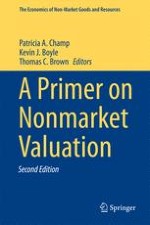2017 | OriginalPaper | Chapter
3. Collecting Nonmarket Valuation Data
Author : Patricia A. Champ
Published in: A Primer on Nonmarket Valuation
Publisher: Springer Netherlands
Activate our intelligent search to find suitable subject content or patents.
Select sections of text to find matching patents with Artificial Intelligence. powered by
Select sections of text to find additional relevant content using AI-assisted search. powered by
